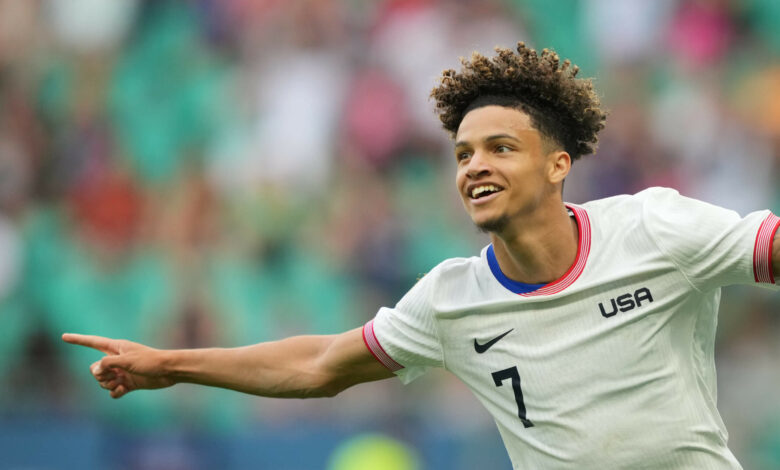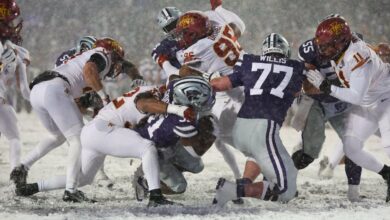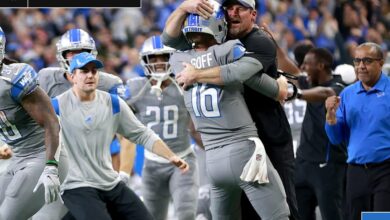US Olympic men’s team reaches quarterfinals for first time since 2000

For the first time in 24 years, the United States is in the knockout rounds of Olympic men’s soccer. The last time the U.S. men were in the tournament was in 2008, and the last time they advanced was at the 2000 Sydney Olympics, where they lost to Chile in the bronze medal match.
On Tuesday, the US took on Guinea in the final group match, scoring two goals in the first half hour to take control of the deciding clash. Colorado Rapids midfielder Djordje Mihailovic opened the scoring with a perfectly executed free kick into the top corner, while VfL Wolfsburg winger Kevin Paredes finished off an ambitious run past the defensive line with a well-placed shot just inside the penalty area.
Going into Tuesday’s final, the U.S. knew it had to match or surpass New Zealand’s showing to advance from Group A to the quarterfinals. Early goals kept Team USA in control of its destiny, though group leaders France did them a favor by scoring three goals against New Zealand in their 3-0 win.
Despite losing to France in the opening match, the subsequent pair of victories were enough to see the United States finish second in Group A behind the hosts. They will face Morocco in the opening match of the quarter-finals on Friday, August 2 at 9:00 Eastern at the Parc des Princes, home of Paris Saint-Germain. Morocco won Group A in dramatic fashion, only confirming victory in the opening match against Argentina after an hour-long VAR review ruled out a potential Argentine equalizer. They lost their second match to Ukraine, before a 3-0 victory over Iraq gave them control of Group B thanks to a direct tiebreaker with Argentina.
Throughout the group stage, US head coach Marko Mitrovic’s side was content to cede possession and prioritized maintaining a strong defensive formation. This largely played to the strengths of the squad — from veteran center backs FC Cincinnati’s Miles Robinson and Nashville SC’s Walker Zimmerman to a fullback tandem of New York Red Bulls’ John Tolkin and Philadelphia Union’s Nathan Harriel — who aren’t often called upon to play roles that rely on possession-based soccer with their MLS clubs.
Mitrovic doubled down on that emphasis with his lineup on Tuesday. Injured deep-lying playmaker Gianluca Busio was absent after appearing to aggravate an earlier right hamstring injury against New Zealand. He was replaced in midfield by the defensive-minded Maximilian Dietz. Mitrovic also opted to remove tenacious striker Duncan McGuire in favor of Griffin Yow. Yow offered more pace in exchange for less power, which fit into a game plan that focused on capitalizing on fast breaks rather than winning headers to retain possession.

Team USA redoubled its efforts to defend in the second half, with possession dropping from 40.8 percent to 35.8 percent after the break. They held firm under pressure from Guinea, limiting the National Elephants to taking their first four shots of the second half from non-threatening positions. Their patience paid off, as Paredes capped a rare attempt to get upfield with another impressive left-footed strike into the top right corner of the Guinea penalty area.
¡DOBLETE DE KEVIN PAREDES! ⚽️⚽️
Spectacular remate of the region and marca su second in the encuentro 👊
📺 Peacock ➡️ https://t.co/VaqAtvA4FM
📱 Telemundo APP ➡️ https://t.co/QnXv7dz5ny#Olympic GamesTelemundo #Olympic Games in Paris photo.twitter.com/1UaHoSlVhv— Telemundo Deportes (@TelemundoSports) July 30, 2024
In all three games, the United States relied heavily on Mihailovic and Paredes to control the game in the final third. The pair combined to create 13 of the team’s 34 chances while scoring four of their seven goals. Both players were substituted in the second half to ensure optimal fitness for the quarterfinal. The U.S. will also be keeping a close eye on Busio’s fitness, as the midfield sorely lacked his spark and decisive distribution against Guinea.
Overall, the United States can be proud of what has been a controlled and cohesive group stage. Only two teams (France and Paraguay) have created more chances per game than their 11.3 average, while their 1.9 expected goals per game narrowly edged out Spain for the highest average in the 16-team field. The defenders are doing their part, too, with only three teams winning a higher percentage of duels than Team USA’s 54.5 percent.
Mitrovic has the team play typical tournament football: defend well and not lose too much when there are attacking chances.

The 18-player roster that qualified for the knockout stage looks very different from the players selected for the U.S. men’s national team during the recent Copa America. Players such as Christian Pulisic, Gio Reyna and Weston McKennie did not play in France.
This is for two reasons. First, men’s football at the Olympic level is limited to players under 23, with a limit of three players over 23. Defenders Zimmerman and Miles Robinson, and midfielder Mihailovic, were selected for the remaining spots at the Paris Games.

GO DEEPER
Why isn’t Christian Pulisic playing for the US men’s soccer team at the Olympics?
It also means that the three overage players are the only members of the team who were still alive the last time the U.S. men reached the quarterfinals at the Olympics. Now they are all part of history.
This group from the United States will also be familiar with its quarter-final opponent, Morocco, whose senior team advanced to the semi-finals of the 2022 World Cup. Their under-23 teams faced each other on a neutral site in Spain in November 2023, with Morocco enjoys a 1-0 victory. Many players from the current United States squad participated in that friendly. Among the Olympians who were not on the field in that defeat were goalkeeper Patrick Schulte, Paredes and the aforementioned trio of overage players.
Recommended reading
(Top photo: John Todd, Getty Images)




